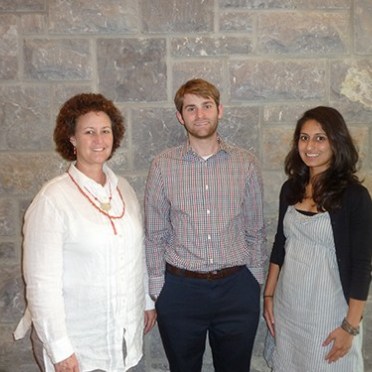CLiGS XMNR Students working with WWF on Supply Chain Innovations for Soft Commodities
November 15, 2013
By: Barbara McCutchan
Three of the current Executive Master of Natural Resources (XMNR) Cohort, Heeral Bhalala, Lise Blackburn P.E. and Spencer Cooper, have chosen to focus their Directed Study Project on a topic that both meets the need of their own professional development goals, and also those of World Wildlife Fund (WWF), namely finding innovations in supply chain management to feed a rapidly growing population on a fixed diet, the resources of one earth. During their third semester of the XMNR, students are able to select a focus study area and each of these students quickly latched on to the opportunity to work directly with Alex Bjork, Manager, Supply Chains, at WWF.
Soft commodities represent fundamental building blocks of the global economy and play a vital role in human and economic development. Agriculture, forest products, and seafood supply chains are responsible for feeding, clothing, and helping to fuel the world. In the past decade, soft commodity markets have experienced unprecedented volatility and scarcity, generating a range of supply chain shocks, social outcries, and policy responses. In many cases, Earth’s natural resources are proving insufficient to meet accelerating global demand. Such trends, exacerbated by effects from climate change, pose a threat to businesses and investors, key ecosystems, and society at large.[1] Recent studies by the United Nations Environment Programme found that up to 90 percent of social and environmental impacts are outside of an organization’s direct operations. In response, companies are rapidly becoming aware of the importance of sustainable production of the soft commodities in their supply chains, analyzing their own environmental impacts and taking measures to mitigate and reduce them. While these actions may be driven by concerns of brand reputation, most are concerned about availability of long-term supply to the raw materials their businesses are most reliant upon. To successfully manage supply chain risk, reduce brand risk, and ensure supply security in the future, supply chain innovation will be at the heart of a company’s strategy and challenge the transactional nature of supply chains that has long been the status quo.
The project will focus on the following knowledge areas:
- Understanding current supply chain models.
- Identifying major organizations or multi-stakeholder platforms (state/government – private/companies – civil society) and their roles in developing new supply chain models for sustainable sourcing.
- Identifying cases studies or examples that companies have implemented which have been successful.
- Extracting lessons from these examples that can inform guidance for other companies considering sustainable sourcing strategies.
This project will help inform the work of WWF and CLiGS, including advancing the XMNR curriculum and the professional development goals for each of the Team members. Bhalala “looks forward to learning about business influences and motivations for sustainably improving the supply chain”. Blackburn is interested in “applying the sustainability case studies knowledge she will gain through this project and the XMNR program to work on other industrial supply chains”. Cooper intends “to use the XMNR program and the outcomes from this project to better understand sustainability issues in order to implement change solutions”.
Bhalala, Blackburn and Cooper are being supervised by Dr. Barbara McCutchan, CLiGS Fellow.
[1] WWF 2050 Criteria






